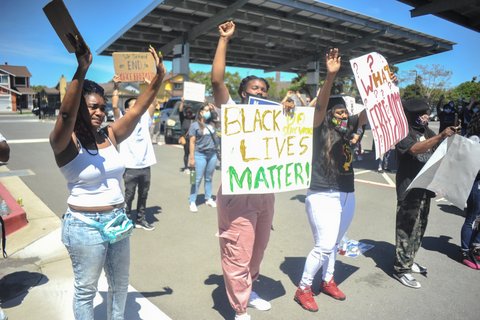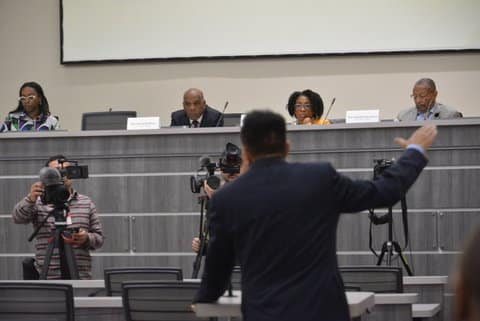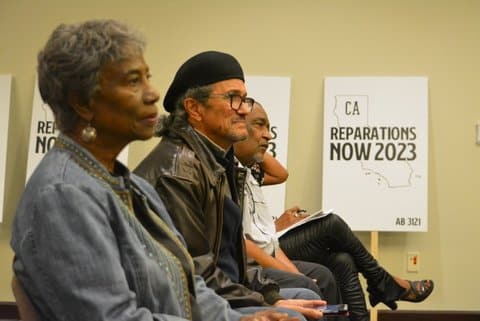
13 Sep As Newsom Weighs Reparations Bill, a Scholar Has a Word of Caution for California

Scene from a protest caravan from San Pablo to Richmond in June. (The CC Pulse file)
By Orlando Mayorquin, CalMatters
Coming off the defeat of a series of police reform bills, racial justice advocates and Democratic lawmakers are hoping to get a more modest measure of socioeconomic change across the finish line, namely a reparations study for Black Californians.
Assembly Bill 3121 cleared the Legislature last month and if signed by Gov. Gavin Newsom, would establish a nine-person task force to study reparations proposals for more than 2 million African Americans in California, many undergoing migratory shifts. The bill, authored by Assemblymember Shirely Weber, directs the task force to study California’s complicity in slavery and develop proposals for redressing generations of discriminatory policies and practices that followed.
Supporters say it’s yet another case of California leading by example. In acknowledging the sins of California’s forefathers, the state could begin to heal by starting with an apology. But as Newsom considers the legislation before him, one scholar has a word of caution not to detract from where change really needs to happen: Washington, D.C.
William Darity Jr., one of the country’s leading experts on slavery reparations and economics professor at Duke University, hopes the conversation around California’s reparations task force is properly framed with respect to the movement for federal reparations.
More of an atonement
Darity Jr. has reservations about the use of the term “reparations” in the bill. He believes it should only be used to describe a full accounting of the damage dealt to African Americans by hundreds of years of enslavement and discriminatory policies — something he says can only be accomplished through the federal government.
“I have a sense of proprietariness about the use of the term reparations, because I think people should not be given the impression that the kinds of steps that are taken at the state or local level actually constitute a comprehensive or true reparations plan,” Darity Jr. said in an interview. “Whatever California does perhaps could be called atonement, or it could be called a correction for past actions.”
The economist is critical of what he calls a piecemeal approach to reparations; where a collection of local and state initiatives form the thrust of slavery reparations in the United States. While AB 3121 is clear about not being a substitute for a national reparations program, Darity Jr. is still worried that the conversation around the project in California might suggest a vision of slavery reparations independent of the federal government.
But Darity Jr. believes the creation of a reparations study team would lock California in as a powerful advocate for federal reparations.
Task force aims to educate public
California lawmakers have already begun to position the state in support of federal reparations. Last year, state lawmakers proposed a joint resolution to support H.R. 40, a congressional bill introduced by Rep. Sheila Jackson of Texas to create a federal reparations study commission. Jackson’s bill has yet to pick up any real steam. One of the California task force’s duties is to put forth a plan to educate the public on its findings.
For Weber, it’s a movement. She views educating state residents integral to winning popular support for future reparations proposals — and curbing animosity toward reparation recipients.
“I’m hoping, being an educator, that a lot of this information is shared so that people don’t develop a bad attitude toward African Americans,” said Weber, a professor emeritus of Africana Studies at San Diego State University. “That the information will be so clear of what has taken place that there would not be this antagonism toward individuals.”
So what does California have to atone for?
The state of California was a “free state” when it became part of the union, but a fugitive slave law meant that slaves who came to California looking for freedom were denied it.
Reparation could look different
Weber and the co-authoring Legislative Black Caucus did not specify the form of compensation a reparations proposal would have to take. That’s up to the experts on the committee to help decide.
Direct payments to African Americans are usually top of mind in conversations about reparations, but Weber wanted to leave room for other forms of redress — pointing to areas like education where direct payments are a less obvious solution.
“I’m looking at housing. I’m looking at education. I’m looking at business — economic development in communities so that there’s adequate investment.”
ASSEMBLYMEMBER SHIRLEY WEBER
“Are we going to have better programs that allow students admission to the university as we do with the DREAM Act?” said Weber. “I’m looking at housing. I’m looking at education. I’m looking at business — economic development in communities so that there’s adequate investment.”
Five members of the task force would be appointed by the governor while the Assembly and Senate leaders would appoint two each. No more than five of the appointees can be members of the Legislature and Newsom would be required to appoint three civil rights and reparations experts. The task force would have one year to complete its work with the first meeting held by June 2021.
There was no formal opposition to the bill, but 15 Republicans voted no on the final version.
Republicans oppose adding cost
GOP Assemblymember James Gallagher, who voted against the bill, said he is open to the commission’s suggestions for closing education and economic disparities, but thinks that a study commission needlessly prolongs the policy process and shuts out Republican voices.
“It’s like almost assuredly designed to be people from one party and probably from more of one perspective than the legislative process, which would include everybody,” Gallagher said.
The Yuba City lawmaker agrees with Darity Jr., the reparations scholar, that conversations should happen at the federal level. But they differ on direct payments. Gallagher said he doesn’t believe cash is the best way to address issues facing the Black community.
“I think there might be a majority of people who might be supportive of that concept, but I think they would have a very hard time figuring out how they’re going to pay for it, especially when the state of California is looking at, at a minimum, a $40 billion deficit next year,” Gallagher said.
Weber is aware of the headwinds given the defeat of Black Lives Matter proposals intended to hold officers accountable for misconduct. “I don’t live with any illusion that George Floyd has changed the world,” Weber said. “He has raised some eyebrows and opened some eyes, but I think we saw in the last session that people may be, as the kids say, ‘woke,’ but they’re not moving.”
This article is part of The California Divide, a collaboration among newsrooms examining income inequality and economic survival in California.






No Comments